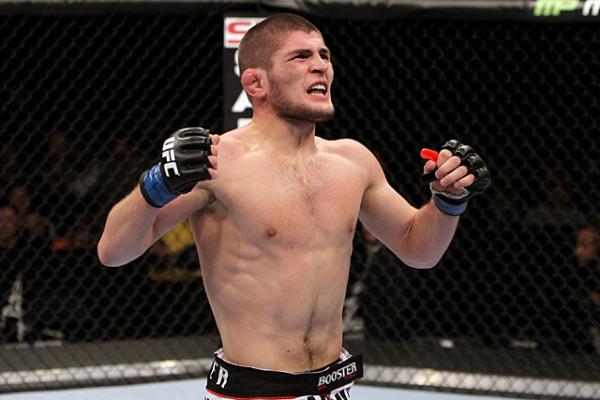Mountain Man

Khabib Nurmagomedov has finished nine of his opponents in the
first round. | Josh Hedges/Zuffa LLC/Getty Images
What is the best breeding ground for future champions? Is it the United States, with its high-tech training facilities and world-class coaching staffs? Is it Brazil, with its favelas, poverty and steep crime rate, where one oftentimes has three options: to become strong, to remain poor or to wind up dead? Or is it Japan, the cradle of many martial arts, where fighters tend to live in 100-square-foot cubes in order to pursue their dreams?
Khabib Nurmagomedov was born in Slide, Dagestan -- a mountain village so tiny, you cannot even find it on Google Maps. Life there is harsh and filled with deprivation. Most villagers work as farmers, lumberjacks or shepherds. Every once in a while, one sets out to serve in the Russian Army and return a real man.
Advertisement
Despite his youth, Nurmagomedov’s journey has already been a long one. He started wrestling at the age of 5 under the tutelage of his father, Abdulmanap.
“My father has invested a lot of time and energy in me,”
Nurmagomedov said. “It is because of him that I am the man I am
today.
“I spent my childhood in the gym, although I fought quite a bit in the streets, as well. My record on the streets is even better than my MMA record,” he added, switching gears with a well-timed joke.
Plenty of Dagestani wrestlers have reached the pinnacle of the sport, like Olympic medalists Dzhamal Otarsultanov, Makhach Murtazaliev, Shirvani Muradov and Bakhtiyar Akhmedov. However, the mat was not meant to be Nurmagomedov’s home. After two Russian championships in combat sambo, he tried his luck in the ring instead. It was a wise decision.
Advancing through the ranks in regional Russian and Ukrainian events was not the only reason Nurmagomedov had to relocate several times. Since the turn of the millennium, a low-level guerilla war has been unfolding in Dagestan. The Dagestani Front of the Caucasus Emirate’s Armed Forces has been fighting for Dagestan’s independence as an Islamic state and is responsible for the deaths of hundreds of Russian security and military personnel, officials and civilians.
From Slide, Nurmagomedov first relocated to Makhachkala, Dagestan’s capital, before moving on to Kiev, Ukraine. There, he trained at sambo forge Combat Dobro during the formative years of his career before joining the ranks of the UFC in 2012. Now, Nurmagomedov splits time between the Mamishev Fight Team in St. Petersburg, Russia, and the American Kickboxing Academy in San Jose, Calif., where he is completing the hot phase of his latest pre-fight camp.
File
Photo
Tavares has won two in a row.
Nurmagomedov on Saturday plans to hone in on a potential Top 10 ranking at 155 pounds, as he takes on Brazilian jiu-jitsu black belt Thiago Tavares at UFC on FX 7 “Belfort vs. Bisping” at the Ibirapuera Arena in Sao Paulo, Brazil. The Russian lightweight seems to have become an unwitting expert on beating opponents from the Sugarloaf Mountain, having already defeated Tavares’ countrymen, Arimarcel Santos and Gleison Tibau.
“I don’t think you can call me the Brazilian killer,” the secretive all-rounder said. “It just happens that two of my last three opponents were Brazilian. I do feel that combat sambo is the perfect style to battle Brazilian jiu-jitsu, though, and I want to prove that inside the Octagon. I am also banking on my wrestling skills. I have watched pretty much all of his fights, and I think that I have a good plan to counter his BJJ.”
When the bout was first announced, many experts shrugged, believing Tavares was actually a step down in competition for Nurmagomedov, who is coming off a significant win over the even more highly regarded American Top Team representative Tibau. However, this is not a notion with which the young Russian agrees.
“I don’t think Tavares is much weaker than Tibau at all. MMA is an ever-growing sport, and the same fighter can learn a lot more in a short period of time,” he said. “It’s hard to say which skills or style is more important. It’s also difficult to compare two fighters unless they are fighting that very day. Either way, both Tibau and Tavares are among the best lightweights in Brazil.”
While Nurmagomedov has reeled off an impressive nine straight wins over the last two years, Tavares has only fought three times during the same time span. Most recently, the 28-year-old Brazilian missed out on fights against “The Ultimate Fighter” Season 13 winner Tony Ferguson due to injury and Dennis Hallman due to a weight-cutting dispute, effectively putting him on the sidelines for the last 370 days.
“I think [his lack of activity] will definitely affect him, as it’s hard for a fighter to take that much time off in addition to suffering an injury,” Nurmagomedov said. “I have still trained very hard for him, as it’s the most important fight in my life. I have worked a lot with Jon Fitch for this fight [since he] has a grappling style very similar to [that of] Tavares. We have sparred countless hours. I am definitely prepared to deal him his first defeat in his home country.”
“
lot of time and energy in me.
It is because of him that I am
the man I am today.”
”
“I have become pretty popular in Russia. People recognize me in the streets and at various events such as soccer games,” he said. “I try not to pay attention to that, though. Stardom fever is not good for an athlete.”
Related Articles






